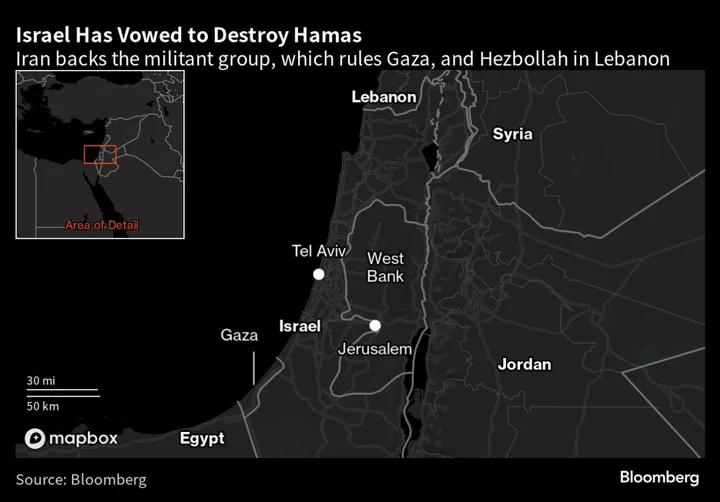As Palestinians celebrated Israel’s release of prisoners outside Ramallah’s sand-colored municipality last Friday, green Hamas flags dotted the crowd and young men donned green caps, the latest signs of the Islamist group’s growing popularity on the West Bank.
Support for Hamas was also evident outside the city’s Abdel Nasser Mosque a few hours earlier, when hundreds of worshipers protested after morning prayers against the war Israel is waging against its forces in Gaza.
The fighting erupted on Oct. 7 when Hamas militants burst into southern Israel from Gaza and went on the rampage, killing 1,200 people and taking 240 hostages. Authorities in the Hamas-run enclave say thousands of Palestinians have been killed in Gaza since Israel hit back with a ground offensive and air strikes that have turned part of the territory into rubble. Prime Minister Benjamin Netanyahu vowed there would be no letup until Hamas, which is designated a terrorist group by the US and European Union, has been completely destroyed.
That goal is looking elusive, with the group’s heavily armed fighters dug in in tunnels that run for hundreds of miles beneath Gaza. A truce to allow for the exchange of hostages and Palestinian prisoners went on for a seventh day, with talks under way to extend it. International pressure is mounting for a lasting cease-fire.
An even bigger problem for Netanyahu is the backing Hamas has garnered in the West Bank, the larger of the two Palestinian enclaves, which is partially ruled by Mahmoud Abbas’ Palestinian Authority and has been under Israeli occupation since 1967.
Interviews with a dozen Palestinians from all walks of life suggest that events of the past eight weeks have bolstered Hamas’ stature and weakened the more moderate Abbas administration.
“Hamas in the West Bank is becoming more popular, more relevant and more powerful, and in return the Palestinian Authority is further marginalized and less popular,” said Ghassan Khatib, a former Palestinian labor minister and lecturer at the territory’s Birzeit University. “You cannot eradicate Hamas. As long as there is no addressing of the political root of these rounds of violence, it will continue.”
Israel withdrew its troops and settlements from Gaza in 2005. Palestinian legislative elections held the following year saw Hamas defeat the Palestine Liberation Organization’s Fatah faction, which dominates the Palestinian Authority. In 2007, Hamas threw Fatah out of Gaza by force and has ruled there ever since.
While the PLO recognized Israel in 1993, Hamas rejects the existence of the Jewish state.
Ophir Falk, Netanyahu’s foreign policy adviser, said that Hamas’ removal from Gaza is a prerequisite for peace. Former Palestinian Authority spokeswoman Nour Odeh sees that view as misguided.
“You cannot pretend Hamas doesn’t exist,” she said. “You can’t pretend Islamic Jihad doesn’t exist. They’re not a small nuance. And it’s not about their military power. It’s about the fact that in a situation of complete paralysis politically, complete ineptitude and a breakdown in international engagement, here’s a group that has released prisoners, that has fought back and punched hard.”
A survey published this month by the Arab World for Research and Development, a Palestinian polling group, found 83% of 391 respondents on the West Bank were supportive of what it described as “Palestinian resistance” on Oct 7.
“People feel like we got some revenge,” said Khalid Rodil, a West Bank teacher. “Hamas is standing up for us.”
Hamas is less favorably viewed in Gaza, where its rule has been marred by persistent allegations of corruption and incompetence — 64% of 668 people canvassed there in the AWRD poll backed its strike on Israel.
Eman Baraka, 34, a volunteer at a hospital in the southern Gaza city of Khan Younis, which houses tens of thousands of people displaced by the war, said Hamas is facing criticism for failing to consider how civilians would be affected by its attack and for the way it has handled the distribution of aid.
“Even some of those who support Hamas say it has devastated them,” she said by phone.
Reham Owda, a Gaza-based analyst, accused Hamas of only concerning itself with the liberation of a limited number of prisoners from the West Bank and Jerusalem to further itself politically.
“It has left more than 2 million Gazans alone to face their fate, exposed to the worst kinds of killing and destruction, and delegated the responsibility of protecting civilians to international organizations,” she said. “I believe that once the war is over, the intensity of this criticism against Hamas will openly increase. It is expected that support from Gazans in any upcoming elections will lean towards independent civil political figures and Fatah.”
Accurately gauging how much popular support Hamas commands in Gaza is tricky because the territory last held elections in 2006. Backing for the group increased during its previous wars with Israel, but declined after hostilities ended.
Hamas’ ideology is likely to endure regardless of the outcome of the war, according to Mairav Zonszein, a senior analyst at the International Crisis Group,
Even if Hamas ceases to exist as a political party and some of its leaders are killed or go into exile, “you will have something else that will come in its stead,” she said.
Prospects for a Continuing Israel-Hamas Truce: Big Take Podcast
--With assistance from Antony Sguazzin and Gina Turner.

